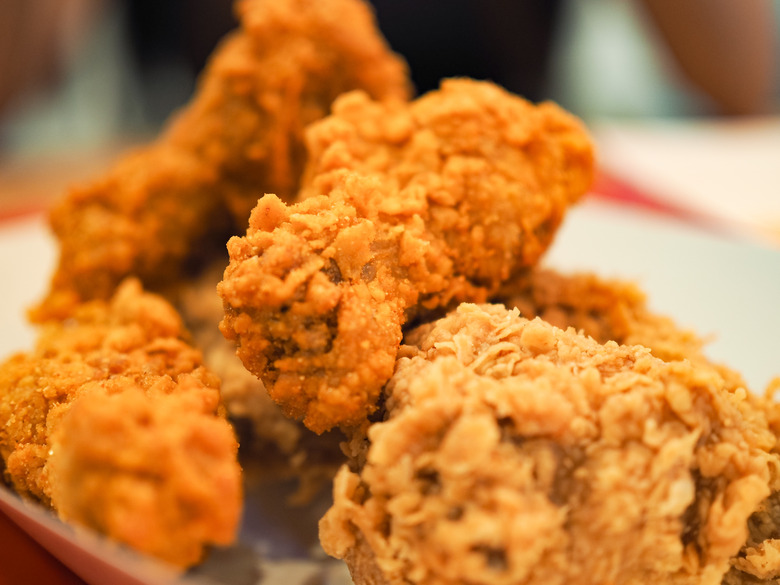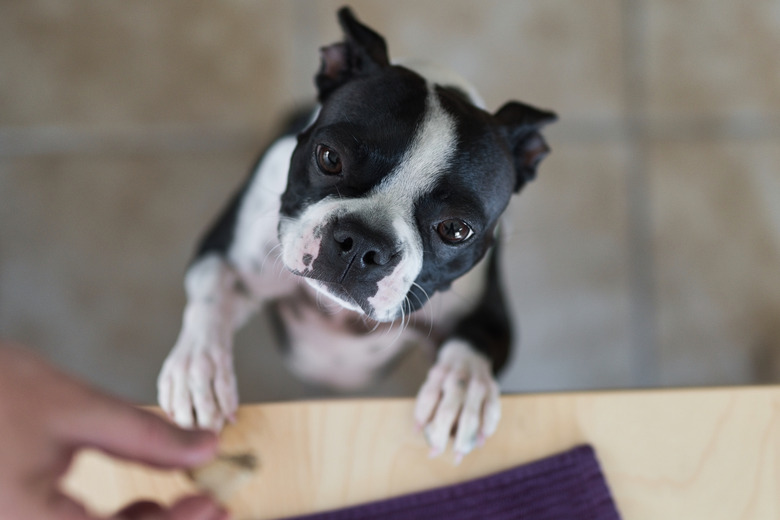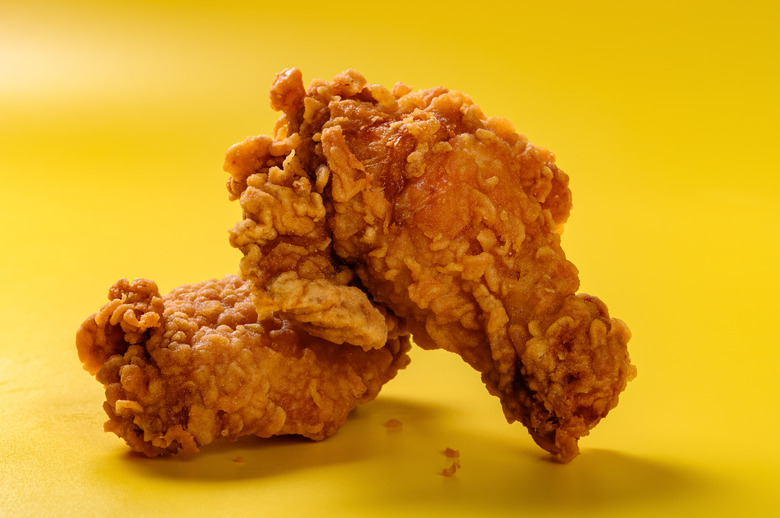Can Dogs Eat Fried Chicken?
Crispy, crunchy, tender, and juicy, Southern fried chicken is one of America's favorite foods. Just thinking about it makes some people's mouths water! Originating in the Southern states in the mid-1800s, this tantalizing, almost addictive dish is bursting with flavor and is a go-to for Sunday dinners, picnics, and special occasions.
Heavily laden with fat, salt, seasonings, spices, and calories, fried chicken may be good old-fashioned people food, but it's definitely not an appropriate food for dogs.
You may be tempted to share your fried chicken with your dog, but as a responsible pet parent, you're best to cook up some bland, boneless, skinless chicken breast for him instead.
What is fried chicken, anyway?
What is fried chicken, anyway?
Down south, fried chicken is a religion, says Mike Staib of ErgoChef's Chop Talk blog for chefs. Craggy, golden batter on the outside, succulent perfection on the inside, it is the food of the gods and many consider fried chicken one of the most delicious foods on earth. In fact, family recipes are passed down from one generation to the next like fine heirlooms.
But what is fried chicken, anyway? Southern fried chicken, known as simply "fried chicken" has a rich history dating back to the middle ages when the Scots started deep frying chicken in fat, but without batter or any seasonings. Scottish immigrants brought their recipes to America and the dish became a staple, later enhanced with the iconic batter, seasonings, and spices introduced by African-Americans who fried it in palm oil.
Southern fried chicken is a dish composed of bone-in, skin-on chicken pieces that are marinated in buttermilk and dried herbs, then coated in flour, or dipped in milk or egg and then coated in flour, and an assortment of seasonings including salt, onion powder, garlic powder, basil, thyme, celery salt, sage, white pepper, black pepper, savory, oregano, paprika, and cayenne, among others, according to taste preferences. The battered chicken is pan fried in oil or lard, a deep fryer device, pressure cooker, or broasted.
Can dogs eat fried chicken?
Can dogs eat fried chicken?
No, dogs should not eat fried chicken. Fried foods, in general, are poor choices for a dog treat, even occasionally. Chicken is ubiquitous in pet foods, but just because chicken is the chief component in many commercial dog foods, kibble, and canned foods, it seems like it would be OK to feed your dog anything with chicken in it, but pass on the fried chicken.
Yes, chicken is a healthy protein source, but when it's slathered in batter and seasonings like garlic and onion that are not dog-friendly, then fried up in copious amounts of fat to become glorious Southern fried chicken (for humans), it morphs into a potential recipe for disaster for your dog.
What are the concerns with feeding fried chicken to dogs?
What are the concerns with feeding fried chicken to dogs?
Fat dogs are not happy, or long-lived dogs, and therein lies only one of the reasons not to feed your dog fried chicken. Teeming with fat, fried chicken eaten on any regular basis will pile on the pounds for your dog.
With obesity comes diseases like pancreatitis, which appears to be a common cause of diabetes in dogs. While these diseases may be genetic or have other causes, eating fried chicken and other fatty foods are environmental contributing factors that you can control.
The American Kennel Club cautions against feeding fatty and fried foods, and explains, "Just as fatty and fried foods are not good for humans, they are even worse for dogs." Fatty, fried, and salty foods put your dog at risk for heart disease.
The onion and garlic seasonings often used in fried chicken are also toxic to dogs.
Another concern with your dog eating fried chicken are the bones. Cooked chicken bones easily break and splinter sending slivers of bone fragments every which way. Just for the potential hazard of choking on the bones, scratching or puncturing his esophagus, or intestinal blockage or penetration, which can be fatal and necessitates life-saving surgery, are enough to keep your dog away from fried chicken.
The best ways to feed chicken to dogs
The best ways to feed chicken to dogs
Next time you're enjoying some scrumptious fried chicken and your dog is giving you that "look," don't give in. If you like sharing dinner with your dog, or doling out special treats now and then, you should prepare, in advance, some boneless, skinless chicken breasts to have on hand for just such an occasion. High in protein and healthy, boiled breast is a great way to feed chicken to your dog.
Create individual portions of boiled chicken that can be shredded into your dog's usual food, whether it be a homemade diet or dry kibble, and freeze the rest in individual-serving-size reclosable plastic bags for future chicken cravings, or get creative and incorporate chunks or shreds of chicken into dog cookies or muffins. Or, you can make a simple, yummy polenta (cornmeal) infused with a bit of cheese or vegan cheese, a variety of sliced and crumbled veggies like carrots and cauliflower, and shaved chicken. If your dog cannot eat corn due to allergies, bake a sweet potato and mix the chicken into the flesh, then spread out in a pan. Sprinkle this delightful dog casserole with a little nutritional yeast and fresh parsley, cut into individual serving-sized squares, and serve.
And, by the way, dogs don't really know the difference between your relatively bland chicken offerings and fancy cornmeal or sweet potato casseroles and the real thing — genuine fried chicken. To your dog, any treat that tastes remotely like chicken is like fried chicken heaven for you.
Conclusion
Conclusion
Dogs should not eat fried chicken. Undoubtedly, Southern fried chicken is one delicious dish, but it doesn't belong on your dog's plate. Eating fatty, fried foods like fried chicken can cause heart disease, obesity, pancreatitis, and diabetes in dogs. Additionally, the seasonings and spices may also be toxic to your dog. Try chicken alternatives such as boiled boneless, skinless chicken breast which can be given as a high-protein treat occasionally.
For more dog treat ideas, check out our list of everything dogs can and cannot eat.
Always check with your veterinarian before changing your pet's diet, medication, or physical activity routines. This information is not a substitute for a vet's opinion.
References
- ErgoChef: History of Fried Chicken
- AKC: Seven Foods Your Dog Should Not Eat
- Oxford Academic Journal of Nutrition: Canine and Feline Diabetes Mellitus: Nature or Nurture?
- Dr. Pitcairn's Complete Guide to Natural Health for Dogs & Cats; Dr. Richard H. Pitcairn, DVM, PhD and Susan Hubble Pitcairn


